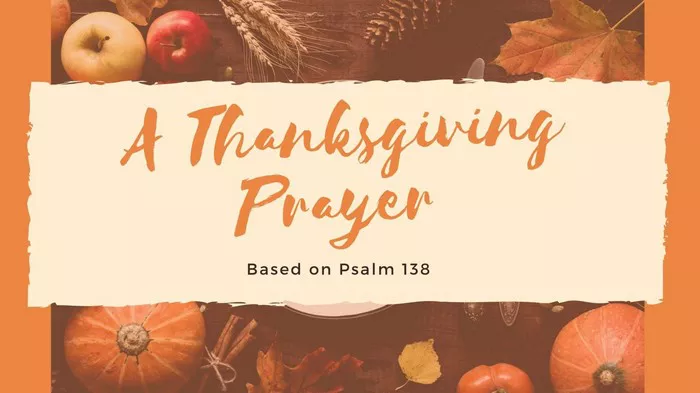In a world inundated with distractions and trials, the concept of thanksgiving and thankfulness holds a timeless significance. Beyond its cultural and societal observance, the essence of thanksgiving finds its roots deep within the pages of sacred scripture. The Bible, revered by millions as the word of God, offers profound insights into the meaning and practice of thankfulness.
Gratitude as a Virtue: Understanding the Biblical Foundation
At the heart of the biblical narrative lies the notion of gratitude as a virtue. From the Old Testament to the New Testament, numerous passages emphasize the importance of giving thanks. Psalms, in particular, serve as a reservoir of gratitude, with verses such as Psalm 100:4 exhorting believers to “Enter his gates with thanksgiving and his courts with praise; give thanks to him and praise his name.”
Moreover, the apostle Paul, in his letters to various churches, frequently underscores the necessity of thankfulness. In his epistle to the Colossians, he writes, “And whatever you do, whether in word or deed, do it all in the name of the Lord Jesus, giving thanks to God the Father through him” (Colossians 3:17). This injunction highlights the pervasive nature of gratitude in the Christian life, extending even to the most mundane aspects of existence.
Thanksgiving as an Act of Worship
Beyond mere verbal expression, biblical thanksgiving transcends into an act of worship. In the Old Testament, sacrificial offerings were often accompanied by expressions of gratitude to God. The book of Leviticus delineates various offerings, including the thanksgiving offering (Leviticus 7:12), which symbolized a response to God’s goodness and provision.
Similarly, Jesus’ own ministry exemplified a life steeped in gratitude and worship. In the account of the feeding of the five thousand, Jesus takes the loaves and fish, looks up to heaven, gives thanks, and distributes them to the crowd (Matthew 14:19). This profound act not only demonstrates Jesus’ gratitude to the Father but also foreshadows the ultimate sacrifice of thanksgiving—his death on the cross for the redemption of humanity.
Thankfulness Amidst Adversity
The biblical narrative is replete with instances of thanksgiving amidst adversity. Job, often regarded as the epitome of suffering, offers a poignant example of maintaining gratitude in the face of profound loss. Despite enduring unimaginable trials, Job declares, “Naked I came from my mother’s womb, and naked I will depart. The Lord gave and the Lord has taken away; may the name of the Lord be praised” (Job 1:21).
Likewise, the apostle Paul, no stranger to hardship, exhorts believers to give thanks in all circumstances (1 Thessalonians 5:18). His own life, marked by persecution, imprisonment, and affliction, serves as a testament to the transformative power of gratitude. In his letter to the Philippians, he writes, “Do not be anxious about anything, but in every situation, by prayer and petition, with thanksgiving, present your requests to God” (Philippians 4:6). This admonition underscores the link between gratitude and trust in God’s providence, even amidst trials.
Cultivating a Lifestyle of Thanksgiving
While thanksgiving is often associated with seasonal observances or special occasions, the biblical mandate is clear: gratitude should permeate every aspect of the believer’s life. Cultivating a lifestyle of thanksgiving requires intentionality and mindfulness, rooted in a deep understanding of God’s character and faithfulness.
Central to this practice is the recognition of God as the ultimate source of all blessings. James, the brother of Jesus, reminds believers that “Every good and perfect gift is from above, coming down from the Father of the heavenly lights, who does not change like shifting shadows” (James 1:17). By acknowledging God’s goodness and provision, believers are invited into a posture of humility and gratitude.
Moreover, gratitude finds expression not only in words but also in deeds. The apostle John writes, “Dear children, let us not love with words or speech but with actions and in truth” (1 John 3:18). Thus, acts of kindness, generosity, and service become tangible expressions of thanksgiving to God and others.
Conclusion
In conclusion, the biblical meaning of thanksgiving and thankfulness transcends mere cultural observance or sentimentality. It is rooted in a deep understanding of God’s character, faithfulness, and provision. From the sacrificial offerings of the Old Testament to the sacrificial love exemplified by Jesus Christ, gratitude permeates the entirety of the biblical narrative.
Moreover, thankfulness is not contingent upon favorable circumstances but is a choice—a deliberate response to God’s goodness and sovereignty. Whether in times of abundance or adversity, believers are called to maintain an attitude of gratitude, trusting in God’s providence and faithfulness.
As we reflect on the profound biblical meaning of thanksgiving and thankfulness, may we be inspired to cultivate a lifestyle characterized by gratitude, worship, and acts of kindness. In doing so, we not only honor God but also bear witness to His transformative power in our lives and in the world around us.

